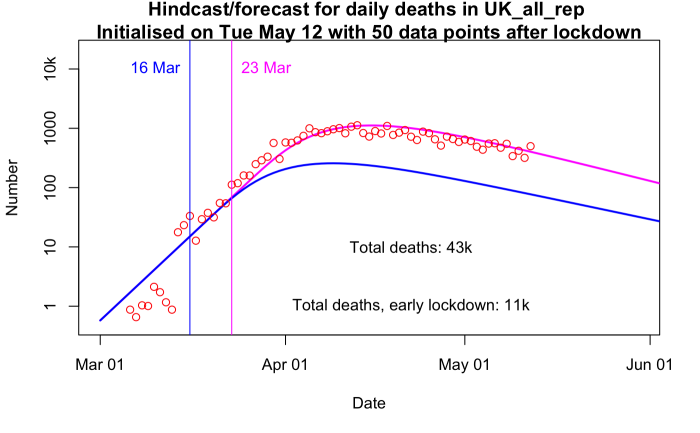The Telegraph reports that if Britain had locked down one week earlier, 75% of British Covid-19 deaths would have been prevented. It’s attracted the attention of the BBC’s Jeremy Vine, and George Monbiot in The Guardian.
It’s based on a model by James Annan, a climate scientist, published on his blog, which was mentioned briefly by the BBC’s always fantastic More or Less programme on Tuesday.
I’m not here to debunk the model, exactly, and I would never dare contradict the More or Less team. I just wanted to flag a reason to be concerned with it.
The word ‘model’ can describe many things, from an all-singing, all-dancing climate model which simulates the action of the entire atmosphere and ocean system down to cubic-kilometre units, to a simple statistical curve which says ‘if X goes up by 1, Y will go up by 2’. The Annan model is very much at the latter end.

Its model is amazingly simple: Covid-19 infections were doubling about every 3.5 days in March; that means you get two doublings in a week. So, if lockdown had happened a week earlier, it would have prevented two doublings, so you’d have got a quarter as many infections and therefore a quarter as many deaths.
You barely even need to call it a model: it’s a back-of-the-envelope calculation.
That doesn’t make it wrong. Simple models are not bad; sometimes they’re more appropriate. But simple models are simple. There’s lots they don’t take into account.
Most noticeably, this one assumed that if lockdown had happened a week earlier, everything else would have happened a week earlier too. But we know that by the time lockdown happened, British lives were already very different. People were voluntarily behaving very differently even without government orders. Schools had closed a week earlier, but I know people who’d taken their kids out of school even before then. I was avoiding public transport, as were millions of others; many businesses were already working from home.
The peak of deaths came on 8 April. That’s barely two weeks after lockdown — surprisingly fast, given that the mean time from infection to death is 20 days, although the median time is shorter. Lockdown may well have been what made infections actually start to decline, but a statistician I spoke to says it seems very likely that voluntary changes in behaviour had at least some effect on flattening the curve.
So it’s not as simple as lockdown a week earlier –> two fewer doublings –> 75% reduction in deaths. If we’d moved the entire process forward by a week — school closures, behaviour changes, everything — that might have done it; but a lot of behaviour change was driven by seeing what was happening elsewhere. Britons saw Italy and China and became rightly scared. It’s not easy to see how we’d have brought that forward.
In their report, More or Less addressed another point, which is that the model also assumes that an earlier lockdown would have been as fully complied with as the one that actually happened; a big assumption, given that a week earlier, people might not have been so scared. That caveat hasn’t made it into any of the other coverage.
None of this is to say that an earlier lockdown would not have saved lives. It almost certainly would. But the stark claim that it would have prevented 75% of deaths — 30,000, so far — is wildly overconfident and I think should be reported with far more uncertainty; the true figure could be much lower.










Join the discussion
Join like minded readers that support our journalism by becoming a paid subscriber
To join the discussion in the comments, become a paid subscriber.
Join like minded readers that support our journalism, read unlimited articles and enjoy other subscriber-only benefits.
Subscribe